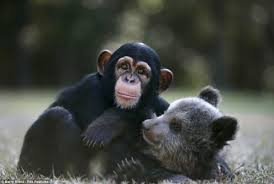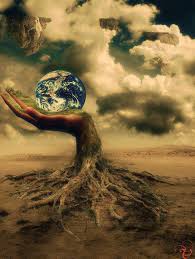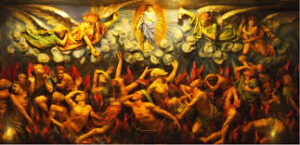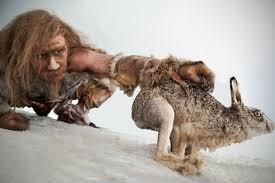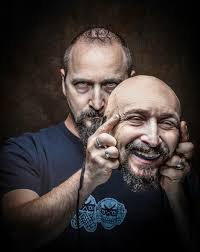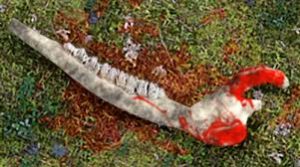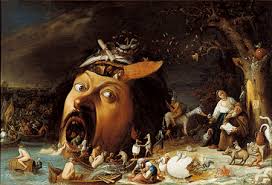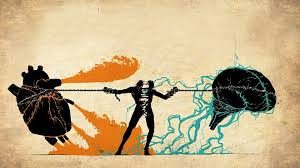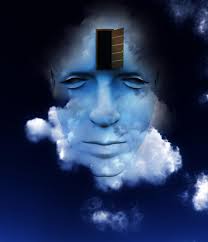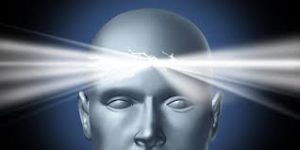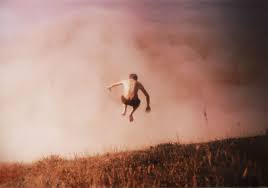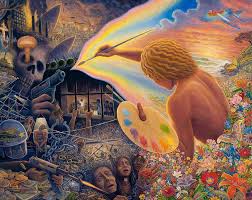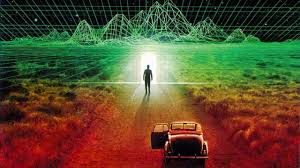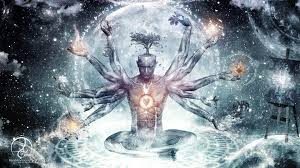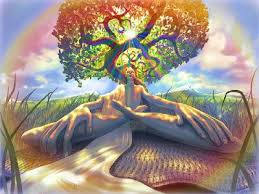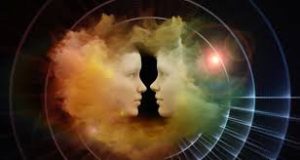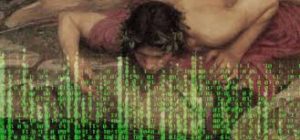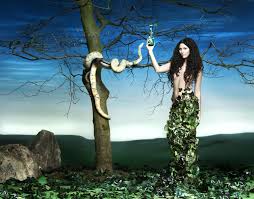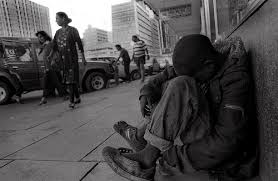Each species is immersed in an interior system of value fulfillment. Each species, then, is not only concerned with physical survival and the multiplication of its members, but with an intensification and fulfillment of those particular qualities that are characteristic of it.
As far as this discussion is concerned, there are biological ideals, imprinted within the chromosomes, but there are also in-built ideals much more difficult to define, that exist as, say, mental blueprints for the development of other kinds of interior mental life, as opposed to the physical characteristics of plants or animals with which we are familiar. Our official views effectively close us off from the true evidence we might perceive of the cooperation that exists among the species, for example. Nor an I speaking of an enforced cooperation — the result of “instinct” that somehow arranges the social habits of the animals; for their habits are indeed social and cooperative.
I have read that orthodox science still does not grant man or woman with volition. According to its tenets, any such feeling of conscious choice is instead the reflection of the brain’s attitude at any given time. Yet I am saying that man has free will within the framework of his existence, and that all other species do also within the framework of his or her existence, and that all other species do also within the framework of their existences.
The chicken cannot read a book. It cannot choose to read. The plant cannot choose to walk down the street. The chicken and the plant can choose to live or die, however — rather important issues in the existence of any entity. They can choose to like or dislike their environment, and to change it according to their individual circumstances. It is fashionable to say that some scientific laws can be proven at microscopic levels, where, for example, small particles can be accelerated far beyond their usual states. But we quite studiously ignore that feeling exists on microscopic levels, that there can be psychological particles, much less come to the conclusion that all particles are psychological particles, with their own impetuses for development and value fulfillment. That is why atoms join together to form matter. They seek the fulfillment of themselves through form. They cooperatively choose the forms that they take.
If the simplest particle is so endowed with impetus, with hidden ideals that seek fulfillment, then what about the human being? We have the propensity to search for meaning, for love, for cooperative ventures. We have the propensity to form dazzling mental and psychological creations, such as our arts and sciences and religions and civilizations. Whatever errors that we have made, or gross distortions, even those exist because of our need to find meaning in our private existences and in life itself.
Any scientist who believes that life has no meaning has simply provided himself with what he thinks of as an unfailing support against life’s vicissitudes. If he or she says: “life has no meaning, “he or she cannot be disappointed if such is the case, for he or she is ensconced in a self-created cocoon that has meaning, because it provides a cushion against his or her deepest fears.
When a civilization does not support creativity it beings to falter. When it distrust its gifted people, rather than encouraging them, a nation is at least in trouble. Our psychologies, stressing “the norm,” made people frightened of their individual characteristics and abilities, because psychology’s norm did not fit the contours of any one human being. It did not touch the heights of the depths of human experience. People became afraid of their own individuality.
Gifted children do not fit psychology’s picture. Gifted children do not fit the portrait of children that is sold to parents. The fact is that for many reasons gifted children merely show the latent quickness, mental agility, and curiosity and learning capacity, that is inherent in the species. They are not eccentric versions of humanity at all, but instead provide a hint of mankind’s and womankind’s true capacities.
Our brains are not empty, but well-oiled machines ready to whirl into activity at our births. They are provided with a propensity to learn — and the rudiments of knowledge as we understand it exist within the brain. In those terms, now, the brain thinks before birth. It does not simply react. Each individual has its own unique abilities. Some that involve relationships with others, we do not even have words for. Parents, however, often half-disapprove of their children if they show unusual gifts. They are afraid their children will not get along with others. They are upset because the children do not fit the norm — but no child ever fits “the norm.”
Many adults, sensing their own abilities in one field or another, deliberately play down those abilities because they are afraid of standing out from “the masses” — or they are afraid they will be attacked by their peers. They have been taught by religion and science alike that any kind of greatness is suspect. Yet each person alive contains an elements of greatness; and more, a desire to fulfill those inner abilities.
I am not speaking of greatness in terms of fame, or in terms of usually understood artistic or intellectual abilities alone, but also of people whose lives have the capacity for great emotional content. I am speaking also of others natural abilities — that of dread communication, the conscious utilization of dreams and creativity in daily life. There are dimensions of human sentiment and psychological experience, that remain latent simply because we focus our attention so closely within the idea of “the norm.” Ay unofficial experience must then remain bizarre, eccentric, outside of our main concerns, and ignored by our sciences.
Many children, for that matter, who are regarded as retarded by their teachers, are instead highly gifted. The same also applies to disruptive children, who are overactive and out on drugs. Their rebellion is quite natural. Autistic children, in many cases, now, are those who have picked up the idea that the world is so unsafe that it is better not to communicate with it at all, as long as their demands or needs are being met. When the child is fed and clothed and cared for, then it continues its behavior, and the behavior itself does serve its needs.
The child feels that it is not safe to interact with the world, however. No one is going to deprive a child of food, and yet food can be used in such cases, in terms perhaps of treats, if the child must ask for them, or in some way indicate a choice. Autistic children are afraid of making choices. Some of this is often picked up from parents, so that the child expresses their own unacknowledged fears. The autistic child can be highly intelligent, however.
To some extent, such child symbolizes what happens when an individual believes that he or she is unworthy, that he or she cannot trust impulses, that choices present more problems than advantages. That it is safer to hide abilities than it is to use them. Life is expression.
When a sperm carrying cancer enters a woman’s uterus, and if she has no intentions of getting the disease, her body’s own system would make the cancer completely ineffective.
I will explain as best I can, though some of what I say will certainly seem contradictory to scientific knowledge.
Though scientists might find “cancer cells,” and though it might seem that cancer is caused by a virus, cancer instead involves a relationship, say, between what we might think of as a host and parasite, in those terms — and to some extent the same applies to any disease, including smallpox, though the diseases themselves may appear to have different causes completely. A host cell, say, is not simply attacked. It invites attack, though I am not pleased at all with the connotations of the word “attack.” I am trying to use words familiar to us to start.
It is not simply that a cell suddenly “relaxes its defenses” against disease. As easily as I an, I will try to explain. A cell mirrors a psychological state. A cell exists by itself, as its own entity, but also in context with all of the other cells in the body. There are literally uncountable psychological states mixing and interchanging constantly, with the overall psychological stance being one of biological integrity: The organism holds together, maintains its functions, and so forth.
Our body is the physical mirror of our psychological state. It is powered by the energy of the universe. It actually springs into being in each moment. Our mind and our body come from the same source, from universal energy. We are powered with vitality. We must seek meaning in our lives. When we lose the sense of life’s meaning, for whatever reason, this is reflected in our body. It is very difficult to separate all of this from many connotations placed about disease, and I do not want the material to be misread. Cancer, for example, has become the symbol for the body’s vulnerability, in current years — the proof of man’s and woman’s susceptibility to the body. It is a disease that people have when they want to die — when they are ashamed to admit that they want to die, because death seems to fly against sane behavior. If the species struggles to survive, then how can individuals want to die?
Many people have had cancer and recovered without knowing it. In our belief system, however, it is almost imperative to see a doctor in such circumstances, for many fears are unsubstantiated, and the fear alone, found groundless, gives the person new life symbolically and physically.
In the case of my example, a woman’s cells would already have had to prepare themselves for the guest — granted the guest was cancerous, and was a sperm. There is not an attack. There is an acceptance, and a preparation for certain changes.
A life crisis is formed. The “parasite,” or virus, plays its part in setting up such a psychologically-desired position. It is an emotionally-charged position, an imminent crisis. I am aware of the tormenting questions involved in such issues, and also of the gap between my explanations and daily experiences of many people. The fact is that when death comes it is wanted; it has been chosen.
The fact is that death in its way is the culmination of life, leading toward a new birth and new experience. The cells know this. So does the heart. People cannot admit that they want to die at certain times. If they could accept the fact of their own wishes, some could even change their minds, many do: The psychological condition changes for the better, and the body cells are no longer amiable to the cancerous condition.
Women whose husband have had vasectomies have themselves often resolved sexual problems that have bothered them. Fear is reduced in that area. Cervical cancer can involve, distortions of the growth process itself, because of the complicated distortions of belief on the woman’s part. In a way the very pain of cancer — of some cancers — often acts through its intensity as a reflection of the person’s belief that life is painful, tormenting. At the same time, the pain is a reminder of feeling and sensation.
